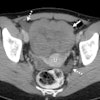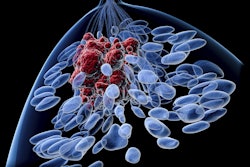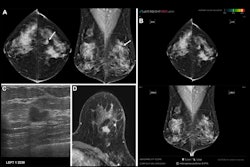Oklahoma state representative Melissa Provenzano (D-Tulsa) had a feeling of uncertainty as she stood on the Senate floor, waiting for the vote to override Gov. Kevin Stitt’s veto on a bill that would make mammograms more accessible.
When Stitt vetoed House Bill (HB) 1389, which had passed in the state house with a 95-to-zero vote, the battle seemed to become steeper. Fortunately for Provenzano, who is currently battling breast cancer, her colleagues in the state senate battled back. On May 29, Oklahoma representatives achieved the two-thirds voting threshold needed to override the governor’s veto. She received a standing ovation after the vote.
"We sat on the floor for hours on a separate bill. Finally, it [HB 1389] arrived around 10:30 p.m. ... to the Senate floor. I don’t think I’ve sat on the Senate floor to watch something like that pass in a long time," Provenzano told AuntMinnie. "It was very moving and I’m forever changed."
The bill has been a labor of love for both Provenzano and Sen. Brenda Stanley (R-42nd District), who have been working on it since the summer of 2024 after Susan G. Komen reached out to have the state expand on a 2022 law on expanding breast care access.
"I’ve always loved working with Melissa," Stanley told AuntMinnie. "People have said to me, 'She’s a Democrat, you’re a Republican.' And my answer to that is cancer doesn’t care."
Expanding care to Oklahomans
While the 2022 bill covers diagnostic mammograms, state legislators have spoken to constituents to determine which breast cancer diagnostics are not covered, such as supplemental MRI and genetic testing. HB 1389 expands access by including contrast-enhanced mammograms (CEMs) and molecular breast imaging in the definition of diagnostic breast cancer exams. Insurance plans will now cover supplemental screenings based on personal and family medical history. The bill will officially take effect on November 1.
"This was an historic piece of legislation. It needed to pass," Stanley said.
Sen. Brenda Stanley details HB 1389's journey through the legislative process, as well as how personal family tragedies fuel her and her colleagues' fight in having this bill pass.
Stitt vetoed the bill, saying premiums would be raised for people with private insurance plans. However, bill authors argue that the downstream savings for cancers found earlier and with a better prognosis would mitigate those costs.
"These screenings are not experimental," according to a letter signed by more than two dozen female state representatives and senators in response to the veto override. "They are recommended by experts and widely recognized as essential tools in the early detection of breast cancer, which saves lives."
"It turned out to be such a blessing that he did veto it," Stanley said. "When he did, it went viral not only in our legislature, but in the state. People were outraged that he vetoed that bill."
A battle that became personal
Provenzano has been dealing with cancer in one way or another for years. Her mother is a breast cancer survivor, but in October 2024, the disease returned. And in December, Provenzano herself was diagnosed with stage I, HER2+ breast cancer.
"The bill language was already in the pipeline and I thought, 'Oh, the irony. This is going to look so self-serving,'" she said.
Provenzano had surgery to remove the tumor, about 5 mm in size, and underwent 12 weeks of chemotherapy. She decided to come out with her cancer diagnosis to her colleagues in the Oklahoma state house after the bill passed committee. Her colleagues responded in kind.
"The next business day, it was the first bill (voted on) and I presented it," Provenzano said. "I was pretty nervous and I turned around to see that there was a sea of pink ties, pins, and shirts. It was such a human moment."
Stanley, meanwhile, has faced family tragedy with cancer in general, losing her husband and sister to the disease, both diagnosed at stage IV.
"The battle for cancer is real for me," she said. "I’ve watched it up close and I have such a heart for it. If both of them had had early detection, they probably would still be here today."
Next steps
Provenzano and Stanley are working with constituents on ways to expand the bill, with a focus on breast density. Breast density in recent years has become an established risk factor for breast cancer, with supplemental imaging needed on top of regular mammograms.
"We always talk about breast density, but I didn’t know there were stages of that [density]," Stanley said.
Stanley added that she hopes to revive a bill that would cover genetic testing for various cancers.
Rep. Melissa Provenzano provides an update on her breast cancer treatment and recovery process.
Susan G. Komen lauded the passage of this bill and a separate bill addressing financial barriers to clinically appropriate genetic testing.
"These critical tests can be expensive and unfortunately many people forego them due to cost," Komen stated. "Early detection of breast cancer is not possible without the medically necessary supplemental imaging required for those at a higher risk of developing breast cancer."
As for Provenzano, she said she is working on getting back to her original self since her treatment concluded.
"I’m working on growing my hair back," she said with a smile. "I’m doing well. I think I move a little slower still, but I’m getting back into shape. Chemotherapy is no joke."
"Melissa had gorgeous hair," Stanley said. "It was long and it was thick. And she had the most amazing wig I’ve ever seen in my life."
"In Oklahoma, it is required to have some sort of coverage for wigs for women," Provenzano said. "And I’m like, 'Well, we got there before we got to diagnostic mammograms.'




















